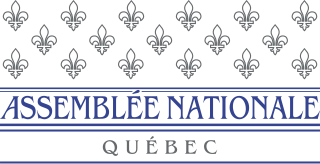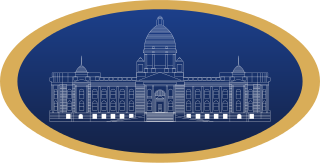External links
| | This article about a Malagasy politician is a stub. You can help Wikipedia by expanding it. |
Patrice Rakotoarimanana is a Malagasy politician. A member of the National Assembly of Madagascar, he was elected as an independent; he represents the constituency of Andilamena.

The president of France, officially the president of the French Republic, is the executive head of state of France, and the commander-in-chief of the French Armed Forces. As the presidency is the supreme magistracy of the country, the position is the highest office in France. The powers, functions and duties of prior presidential offices, in addition to their relation with the prime minister and Government of France, have over time differed with the various constitutional documents since the Second Republic.

The Indian National Congress (INC), colloquially the Congress Party but often simply the Congress, is a political party in India with widespread roots. Founded in 1885, it was the first modern nationalist movement to emerge in the British Empire in Asia and Africa. From the late 19th century, and especially after 1920, under the leadership of Mahatma Gandhi, the Congress became the principal leader of the Indian independence movement. The Congress led India to independence from the United Kingdom, and significantly influenced other anti-colonial nationalist movements in the British Empire.
Unicameralism is a type of legislature, which consists of one house or assembly, that legislates and votes as one. Unicameralism has become an increasingly common type of legislature, making up nearly 60% of all national legislatures and an even greater share of subnational legislatures.

The prime minister of France, officially the prime minister of the French Republic, is the head of government of the French Republic and the leader of the Council of Ministers.

Nandamuri Taraka Rama Rao, often referred to by his initials NTR, was an Indian actor, filmmaker and politician who served as Chief Minister of Andhra Pradesh for seven years over three terms. He starred in over 300 films, predominantly in Telugu cinema, and was referred to as Viswa Vikhyatha Nata Sarwa Bhouma. Rao received three National Film Awards for co-producing Thodu Dongalu (1954) and Seetharama Kalyanam (1960) under National Art Theater, Madras, and for directing Varakatnam (1970). Known for his breakthrough performances in Raju Peda (1954) and Lava Kusa (1963), Rao garnered the Nandi Award for Best Actor for Kodalu Diddina Kapuram in 1970, and the Inaugural Filmfare Award for Best Actor – Telugu in 1972 for Badi Panthulu.

Haradanahalli Doddegowda Deve Gowda is an Indian politician from the state of Karnataka. He served as the 11th prime minister of India from 1 June 1996 to 21 April 1997. He was previously the 14th Chief Minister of Karnataka from 1994 to 1996. He presently is a Member of Parliament in the Rajya Sabha representing Karnataka. He is the National President of the Janata Dal (Secular) party.

The Assemblies of God (AG), officially the World Assemblies of God Fellowship, is a group of over 144 autonomous self-governing national groupings of churches that together form the world's largest Pentecostal denomination.

The National Assembly of Quebec is the legislative body of the province of Quebec in Canada. Legislators are called MNAs. The King in Right of Quebec, represented by the Lieutenant Governor of Quebec and the National Assembly compose the Legislature of Quebec, which operates in a fashion similar to those of other Westminster-style parliamentary systems. The assembly has 125 members elected first past the post from single-member districts.

The prime minister of Vietnam, officially styled as the Prime Minister of the Government of the Socialist Republic, is the head of government of Vietnam who presides over the meetings of the Central Government. The prime minister directs the work of government members, and may propose deputy prime ministers to the National Assembly.

The prime minister of Pakistan is the head of government of the Islamic Republic of Pakistan. Executive authority is vested in the prime minister and his chosen cabinet, despite the president of Pakistan serving as the nominal head of executive. The prime minister is often the leader of the party or the coalition with a majority in the lower house of the Parliament of Pakistan, the National Assembly where he serves as Leader of the House. Prime minister holds office by virtue of their ability to command the confidence of the National Assembly. The prime minister is designated as the "Chief Executive of the Islamic Republic".

The National Assembly is the unicameral legislature of Serbia. The assembly is composed of 250 deputies who are proportionally elected to four-year terms by secret ballot. The assembly elects a president (speaker) who presides over the sessions.

The National Assembly of Pakistan is the lower legislative house of the bicameral Parliament of Pakistan, which also comprises the Senate of Pakistan. The National Assembly and the Senate both convene at Parliament House in Islamabad, the capital of Pakistan. The National Assembly is a democratically elected body consisting of a total of 342 members who are referred to as Members of the National Assembly (MNAs), of which 272 are directly elected members and 70 reserved seats for women and religious minorities from all over the country. A political party or a coalition must secure 172 seats to obtain and preserve a majority.

The Grand National Assembly of Turkey, usually referred to simply as the TBMM or Parliament, is the unicameral Turkish legislature. It is the sole body given the legislative prerogatives by the Turkish Constitution. It was founded in Ankara on 23 April 1920 in the midst of the National Campaign. This constitution had founded its pre-government known as 1st Executive Ministers of Turkey in May 1920. The parliament was fundamental in the efforts of Mareşal Mustafa Kemal Atatürk, 1st President of the Republic of Turkey, and his colleagues to found a new state out of the remnants of the Ottoman Empire.

The Parliament of Pakistan is the federal and supreme legislative body of Pakistan. It is a bicameral federal legislature that consists of the Senate as the upper house and the National Assembly as the lower house. According to the Constitution of Pakistan, the President of Pakistan is also a component of the Parliament. The National Assembly is elected for a five-year term on the basis of adult franchise and one-man one-vote. The tenure of a Member of the National Assembly is for the duration of the house, or sooner, in case the Member dies or resigns. The tenure of the National Assembly also comes to an end if dissolved on the advice of the Prime Minister or by the president in his discretion under the Constitution.

During the French Revolution, the National Assembly, which existed from 17 June 1789 to 29 September 1791, was a revolutionary assembly of the Kingdom of France formed by the representatives of the Third Estate (commoners) of the Estates-General. Thereafter, it was known as the National Constituent Assembly, although the shorter form was favored.

The prime minister of Cambodia is the head of government of Cambodia. The prime minister is also the chairman of the Cabinet and leads the executive branch of the Royal Government of Cambodia. The prime minister is a member of parliament, and is appointed by the monarch for a term of five years. Since 1945, 36 individuals have served as prime minister; 32 as official prime ministers, and 4 in acting capacities.Hun Sen, of the Cambodian People's Party, has been the incumbent prime minister since 1985. He served from 1985 to 1993 and was Second Prime Minister from 1993 to 1998 alongside Norodom Ranariddh (1993–1997) and Ung Huot (1997–1998). Elected as prime minister in his own right in 1998, he is the longest serving prime minister in Cambodian history.

The National Assembly of the Socialist Republic of Vietnam is the national legislature of the Socialist Republic of Vietnam.

Mian Muhammad Shehbaz Sharif is a Pakistani politician and businessman who is currently serving as the 23rd Prime Minister of Pakistan, in office since 11 April 2022. He is the current president of the Pakistan Muslim League (N) (PML-N). Previously in his political career, he served as the Chief Minister of Punjab three times, making him the longest-serving Chief Minister of Punjab.

Mapanna Mallikarjun Kharge is an Indian politician, who is the current president of the Indian National Congress, and Member of Parliament, Rajya Sabha from Karnataka since 16 February 2021. He became the first person outside the Nehru–Gandhi family to be the president of the party after 24 years. He previously served as Leader of the Opposition in Rajya Sabha from 16 February 2021 till 1 October 2022. He was formerly the Minister of Railways and Minister of Labour and Employment in the Government of India. Kharge was a Member of Parliament for Gulbarga, Karnataka from 2009 to 2019.

The National People's Party is a national-level political party in India, though its influence is mostly concentrated in the state of Meghalaya. The party was founded by P. A. Sangma after his expulsion from the NCP in July 2012. It was accorded national party status on 7 June 2019. It is the first political party from Northeastern India to have attained this status.